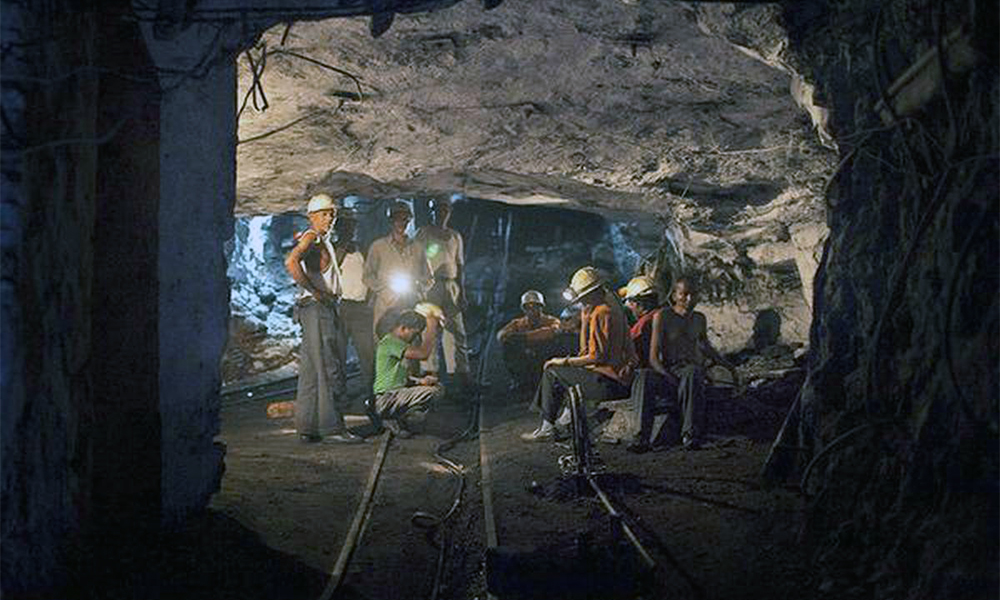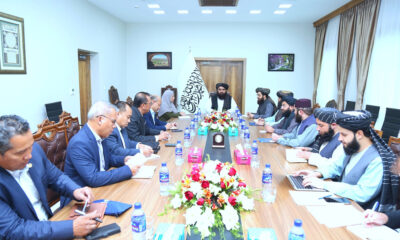Climate Change
UK approves 1st coal mine in decades amid objections

The UK government has given approval for the country’s first new coalmine in 30 years at Whitehaven in Cumbria, according to media reports on Wednesday.
Despite wide-range objections, Levelling-up Secretary Michael Gove gave the green light for the project paving the way for an estimated investment of £165 million ($201.4 million), according to The Guardian.
The proposed mine which would be producing 2.8 million tons of coking coal annually for steel production in the UK and across the world, is expected to create about 500 new jobs in the region.
However, the mine will also produce an estimated 400,000 tons of greenhouse gas emissions a year, increasing the UK’s emissions by the equivalent of putting 200,000 cars on the road, the report said.
Meanwhile, developers said that Whitehaven colliery will be the “world’s first net zero coal mine of its kind”, however environmental groups reacted to the project over being “incompatible with the efforts to address climate change.”
On Saturday, COP26 President Alok Sharma said that opening a new coal mine would be a “backward step” for the UK’s leading role in the fight against climate change.
“Opening a new coal mine will not only be a backward step for UK climate action but also damage the UK’s hard-won international reputation, through our @COP26 Presidency, as a leader in the global fight against climate change,” he said in a tweet.
Climate Change
Rescuers race to reach those trapped by floods in China’s Guangdong

WATCH: Rescuers on boats in China’s flood-ravaged Guangdong province raced to evacuate trapped residents, carrying some elderly people by piggyback from their homes and deploying helicopters to save villagers caught in rural landslides.
The southern Chinese province has been battered by unusually heavy, sustained and widespread rainfall since Thursday, with powerful storms ushering in an earlier-than-normal start to the region’s annual flooding season, Reuters reported.
Eleven people were missing in Guangdong by Monday morning, the state-owned Xinhua News Agency reported without giving further details.
Across the province, 53,741 people have been relocated, with 12,256 people being urgently resettled, Xinhua reported, citing the provincial government.
The cities of Shaoguan, Qingyuan, Zhaoqing and Jiangmen to the west and north of the provincial capital Guangzhou have been particularly hard hit.
In Qingyuan, houses and shops along the Bei River were submerged as the Pearl River tributary swelled, local media reported.
Aerial footage showed flood waters overwhelming a nearby town, leaving only roofs and treetops untouched.
Rescuers in Qingyuan tackled muddy waters, neck-high in some areas, to extract residents, including an elderly lady trapped in waist-deep water in an apartment building, videos on social media showed.
Other social media videos showed water gushing through roads and vehicles in disarray.
In Shaoguan, landslides trapped villagers who had to be rescued by helicopter while other rescuers traveled on foot to reach cut-off disaster sites, Reuters reported.
The Chinese military also stepped in to help clear roads.
The rains eased early on Monday, but some schools in the province were suspended.
Powerful thunderstorms are expected to return later in the week after a brief respite, marking an unusually early wet spell that is more typical in the months of May and June.
Climate Change
Massive river flooding expected in China, threatening millions

Major rivers, waterways and reservoirs in China’s Guangdong province are threatening to unleash dangerous floods, forcing the government on Sunday to enact emergency response plans to protect more than 127 million people.
Calling the situation “grim”, local weather officials said sections of rivers and tributaries at the Xijiang and Beijiang river basins are hitting water levels in a rare spike that only has a one-in-50 chance of happening in any given year, state broadcaster CCTV news said on Sunday.
China’s water resource ministry issued an emergency advisory, CCTV reported.
Guangdong officials urged departments in all localities and municipalities to begin emergency planning to avert natural disasters and promptly disperse disaster relief funds and materials to ensure affected people have food, clothing, water and a place to live, Reuters reported.
The province, a major exporter and one of China’s main commercial and trading centers, has seen torrid downpours for several days and strong winds due to severe convective weather, which has also affected other parts of China.
A 12-hour stretch of heavy rain, starting from 8 p.m. (1200 GMT) Saturday, battered the central and northern parts of the province in the cities of Zhaoqing, Shaoguan, Qingyuan and Jiangmen.
Almost 20,000 people have been evacuated in Qingyuan, according to state media, and some power facilities in Zhaoqing were damaged, cutting power to some places, Reuters reported.
Climate Change
UN sounds ‘Red Alert’ as world smashes heat records in 2023

Every major global climate record was broken last year and 2024 could be worse, the World Meteorological Organization (WMO) said on Tuesday, with its chief voicing particular concern about ocean heat and shrinking sea ice, Reuters reported.
The U.N. weather agency said in its annual State of the Global Climate report that average temperatures hit the highest level in 174 years of record-keeping by a clear margin, reaching 1.45 degrees Celsius above pre-industrial levels.
Ocean temperatures also reached the warmest in 65 years of data with over 90% of the seas having experienced heatwave conditions during the year, the WMO said, harming food systems.
“The WMO community is sounding the Red Alert to the world,” said WMO Secretary-General Celeste Saulo, who took over the job in January.
“What we witnessed in 2023, especially with the unprecedented ocean warmth, glacier retreat and Antarctic sea ice loss, is cause for particular concern.”
She later told reporters that ocean heat was particularly concerning because it was “almost irreversible”, possibly taking millennia to reverse.
“The trend is really very worrying and that is because of the characteristics of water that keep heat content for longer than the atmosphere,” she said.
Climate change, driven by the burning of fossil fuels, coupled with the emergence of the natural El Nino climate pattern, pushed the world into record territory in 2023, read the report.
WMO’s head of climate monitoring, Omar Baddour, told reporters there was a “high probability” that 2024 would set new heat records, saying that the year after an El Nino was typically warmer still.
Tuesday’s report showed a big plunge in Antarctic sea ice, with the peak level measured at 1 million km2 below the previous record – an area roughly equivalent to the size of Egypt.
That trend, combined with ocean warming which causes water to expand, has contributed to a more than doubling of the rate of sea-level rise over the past decade compared with the 1993-2002 period, it said.
Ocean heat was concentrated in the North Atlantic with temperatures an average 3 degrees Celsius above average in late 2023, the report said. Warmer ocean temperatures affect delicate marine ecosystems and many fish species have fled north from this area seeking cooler temperatures, Reuters reported.
Saulo, a meteorologist from Argentina who has promised to strengthen global warning systems for climate disasters, said she hoped the report would raise awareness of the “vital need to scale up the urgency and ambition of climate action”.
“That’s why we spoke about the Red Alert because we must care for the people and how they will suffer from these more frequent, more extreme events,” she told reporters. “If we do nothing, things will become worse and that will be our responsibility.”
-

 Sport5 days ago
Sport5 days agoRashid Khan threatens BBL pullout after Australia postpones Afghanistan T20I series
-

 Sport4 days ago
Sport4 days agoAfghanistan Champions League kicks off with grand opening ceremony
-

 Latest News3 days ago
Latest News3 days agoPakistan’s frontiers minister stresses ‘dignified’ return of Afghan refugees
-

 Regional4 days ago
Regional4 days agoIran’s foreign minister downplays drone attack, says Tehran investigating
-

 Latest News5 days ago
Latest News5 days agoTen people killed by floods in Helmand
-

 Business4 days ago
Business4 days agoAfghanistan’s economic prospects are bleak: World Bank
-

 Latest News4 days ago
Latest News4 days agoMore than 800 Afghan refugees deported from Pakistan in two days
-

 Regional2 days ago
Regional2 days agoIranian president lands in Pakistan for three-day visit to mend ties
























